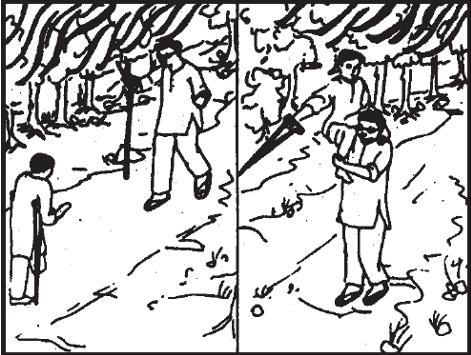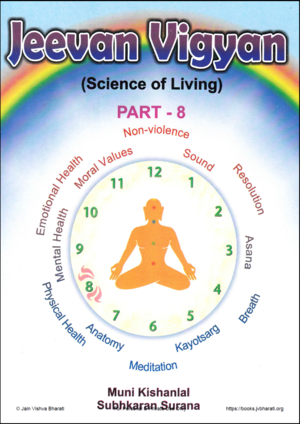Father and son used to dine together. One day, the son told his father, "Sir, I will not be able to dine with you from today onwards". Father was a wise man. He replied, "Alight! Now onwards, I will dine with you". Their dining together continued but only with a minor differences in the arrangement. Earlier, the son had to adjust his activities in such a manner that he could come home on time to have dinner with his father. But now it was the father who had to adjust his activities to be able to dine with his son.
There is, however, one more significant aspect of this arrangement. Father relinquished his ego, his false sense of pride of being an elder, and willingly adjusted his own routine with that of his son, so that both of them could dine together. As a result, the cordial relationship between father and his son did not suffer at all. Harmony was not only maintained but it flourished. Basis of harmony is to stop considering oneself at a higher level than that of others.

Now let us take another example. A blind man and a crippled man somehow got separated from their group of travellers. Individually they were helpless. So they understood the need of each other and pooled their resources. The blind man asked the cripple to sit on his (blind man's) shoulders. Now the cripple guided the way and the blind man walked. Thus with their joint efforts, they reached their destination and rejoined their companions. If the blind man and the crippled had not coordinated their efforts, they could never have reached their destination.
Here is a good example of adjustment and coordination taking into account the mutual needs. A religious congregation was under way. Someone from the audience asked the speaker, "What are your views about coordination amongst religions?" The speaker replied, "This is my favourite subject. When I see religions clashing with each other. I am extremely pained.
Basis of all religions is amity, non-violence and mercy. Can there be any clash among amity, non-violence and mercy? Religion is endless and boundless like the open space. The eternal truth is that religion cannot be separated into components. Clashes occur when everybody tries to prove the supremacy of his religion. But when one looks at religion from the point of view of harmony and coordination. I do not see any reason for clash of any kind. The need, therefore, is to change the viewpoint of every individual."
It is alright if I uphold my own religion, professing it as based on truth. But it would not be correct to say that other religions are based on falsehood. We uphold our religion because we understand its teachings and tenets. If we do not know or understand teachings and tenets of other religions, it does not make them undesirable in any way. Scope of learning, understanding and contemplation should remain open and accessible to all. That which is against the values of truth may be denied, but this denial should not take the form of protest. In other words, when coordination and harmony between people on the issue of religion is reached, clashes would simply not occur. Everybody will follow his respective religion, simultaneously treating all other religions with due respect. Social atmosphere would become pleasant. People professing different faith and religions will be able to live together in perfect harmony and in peace.
Once a shisha (a student Sadhaka) asked his guru, "Gurudev! We see people worshipping in a religious manner. They participate in religious discourses also. But no change appears in their behaviour or life. Why is it so, Gurudev?"
The question was profound. But the guru was also an experienced one. He thought deeply over the question for sometime. Then he ordered the shishya to fetch a pitcher full of wine. The shishya was aghast. How could his question be related to this wine pitcher, he thought. Anyhow he did as he was told. The guru ordered, "Call as shishyas to assemble here". When all assembled, the guru said, "Now, let each one of you come forward, take a draught of wine in your mouth and spit it out the next instant". The shishyas obeyed. The pitcher became empty. The Guru asked, "Did anyone of you become intoxicated by taking wine?"
A shishya replied, "It was not at all possible. Gurudev! Not to speak of wine entering into our physical system, it did not even go down the throat. We took the draught and spat it out the next instant." The guru called the first shishya near him and said, "This is the answer to your question." The shishya was astonished. He said, "But, Gurudev! I cannot make any head or tail of it."
The guru explained. "Today we see religion being practised everywhere in pitcher ful quantity. But it is ejected out the next instant, like you all spat the wine draught just now. Religion touches neither our mind nor does it have any effect on our thought process. How can it transform anything? If religion was to go deep in us, it needs our intellect and logic as the medium. Once a harmonious coordination between religion, intellect and logic is achieved, one would know how to transform one's life and behaviour accordingly."
One alone person cannot oppose others. But man is a social animal. He has to be part of a social system. As soon as the number of people increases, differences start appearing. Hence, difference in opinion, antagonism and antipathy have become a part of our social order. There are bound to be differences in language, dress, food habits and religious and political beliefs. Since we are already living in a society which is full of above mentioned diversities, there is ample scope for opposition, antagonism and antipathy. These negative currents can make our life hell.
But then there is a ray of hope too. Our society offers us innumerable opportunities to make our life happy. If we avail these opportunities, we can bring heaven on the earth. In order to do this we have to stop differentiating between high and low. Each one of us should be considered as complementary to one another. We must shun blind faith. We should test our beliefs and other's beliefs on the anvil of logic and intellect. We should harmoniously coordinate thought, behaviour, beliefs and creeds prevalent around us.
Similarities must be highlighted whereas dissimilarities should be sidelined. To maintain our own dignity, we must respect others. This way, we all will put in a positive contribution towards the making of a fully harmonious and coordinated society. Citizens of such a well-adjustment society will always find congruent elements even among contrasting thing and events. Our capability of adopting a universal and broad viewpoint will develop it.
ANUPREKSHA OF HARMONY
- Mahaprana dhvani: 2 minutes.
- Kayotsarg : 5 minutes.
- Inhale green coloured rays. Visualize the experience that with every inhalation, green coloured rays are entering your body—3 minutes.
- Concentrate green colour on darshan kendra (between eyebrows) in the exercise of dhyan - 3 minutes.
- (a) Concentrate on darshan kendra and carry out anupreksha: "Even among contrasting things and events, I will always find congruent elements. I will develop a universal and broad viewpoint in myself."
Repeat these words 9 times. Carry out the manasik japa using these words 9 times—3 minutes.
(b) Contemplate: "I understand that thought process, life style and beliefs differ from man to man. Highlighting such differences can never bring peace. I hereby assume the Sankalpa that I will never be attracted towards these differences. I will always be actively alert to develop a universal and broad view-point"-5 minutes.
- Complete the dhyan with Mahaprana dhvani-2 minutes.
EXERCISE
- Explain the concept of coordination with the help of examples. How is unity in diversity possible?
- What do you understand by coordinating intellect and logic? Describe all stages of anupreksha of Harmony.
